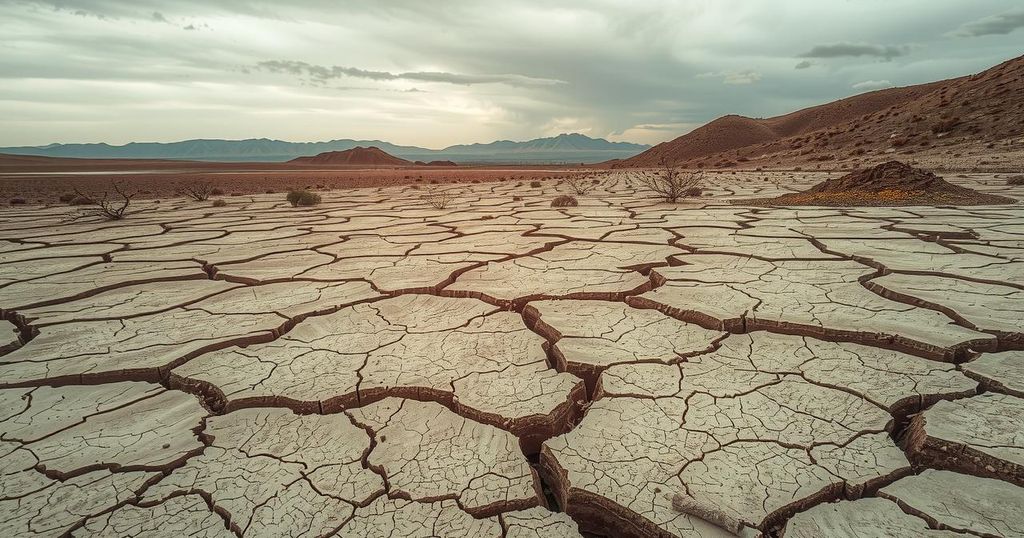President Trump’s cuts to U.S. overseas aid have heightened vulnerability to climate change in Malawi. This includes halted projects that previously aided local communities in adapting to climate crises. Local leaders have criticized these funding cuts, stressing the importance of continued support for sustainable practices and food security amidst increasing drought conditions.
The recent cuts to the U.S. overseas aid budget under President Donald Trump have raised significant concerns regarding their impact on African communities, specifically in Malawi. Climate Home’s investigation discovered that a halted project previously assisted local communities in adapting to climate change effects by protecting forests and generating income, thereby enhancing their resilience against drought.
Local representatives from areas impacted by the USAID-supported program have expressed their discontent with the aid cuts. Lucia Kasimu, chair of the natural resources management committee in Mbatamile village, emphasized the necessity for the U.S. government to reconsider its decision, stating, “It is our plea that the US government rescind its decision – to help the poor. It is their money we know, but this will leave many people suffering from climate change.”
Since its inception in 2019, the Modern Cooking for Healthy Forests Accelerator (MCHF) program, co-funded by the UK, has educated individuals in Salima district to create efficient stoves, cultivate mangoes, produce honey, and foster tree growth. However, a spokesperson from Tetra Tech revealed that the MCHF project is currently under a stop-work order from USAID due to a 90-day freeze on foreign assistance initiated on Trump’s first day in office, negatively affecting climate projects.
Last year’s drought devastated livestock in Southern Africa, including Malawi, where insufficient grass and water led to mass cattle deaths. Enock Joseph, vice-chair of Mbatmile’s resources committee, remarked that the skills imparted by the forest program enabled villagers to generate secondary income for food during climate-induced crises. He noted, “Animals are dying due to drought and people are suffering as a result of climate change. Salima is prone to drought – and when there is hunger, people rely on these economic activities to survive.”
The MCHF program also aimed to reduce firewood demand through efficient cookstoves, essential for protecting Malawi’s forest resources. Joseph warned that the cessation of the program would lead to an increased likelihood of tree-cutting for charcoal as no further training would occur for local food production or environmental management. He characterized the abrupt aid cuts as catastrophic for communities relying on these resources, likening it to “removing an oxygen supply machine from a patient in an ICU so that he dies quickly.”
Although Tetra Tech refrained from further comments, the UK’s Foreign, Commonwealth and Development Office acknowledged their ongoing assessment of the U.S. funding freeze’s impact on development programs.
While Trump had criticized USAID pre-election, his rapid cuts to the agency’s budget were unexpected. His administration indicated intentions to reduce the agency’s budget significantly, though Congressional control complicates these efforts. Following the U.S. cuts, the UK proposed reducing its aid budget, with other European nations considering similar actions.
Communities in the Global South, especially in Africa, are feeling the adverse effects of these aid reductions, with recent reports indicating the U.S. has withdrawn support from important energy and food security programs. Furthermore, the cessation of U.S. participation in the Just Energy Transition Partnerships is viewed as regrettable, yet European nations remain engaged to ensure progress towards clean energy transitions.
Experts warn that these aid reductions, particularly through USAID, will lead to far-reaching humanitarian consequences and potential security implications. Mattias Söderberg from DanChurchAid articulated that while political changes may warrant policy shifts, the manner in which cuts were executed disrupts vital local development work and commitments, resulting in unnecessary hardships for affected populations.
In summary, Trump’s cuts to U.S. overseas aid have significantly weakened the support for crucial programs in Malawi, exacerbating vulnerabilities to climate change. Local communities reliant on the assistance expressed their frustrations, highlighting the negative impacts on food security and economic resilience. The broader implications of these changes resonate through various international aid programs, raising concerns about humanitarian and geopolitical stability in the Global South.
Original Source: www.climatechangenews.com




